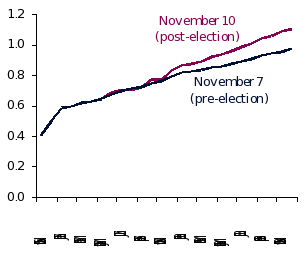Economic Commentary
The election of Donald J. Trump has provided the world with another Brexit-esque political surprise. News of the election outcome immediately triggered a broad risk-off sentiment in financial markets. Equities and yields fell. The yen and euro gained on safe haven inflows while emerging market currencies, particularly the Mexican peso, retreated. But the fragility was short lived and markets rallied with the US dollar, global equities and the change in yields ending the day after the election in positive territory. The shift reflected markets quickly coming to terms with the surprise result and turning their attention to the President-elect’s proposed economic policies and their implications for the US and global economy.
While Trump offered few policy specifics throughout the campaign, he did consistently focus on two key areas of his economic programme. The first was fiscal policy.The President-elect outlined an ambitious and aggressive fiscal easing stance involving significant across-the-board tax cuts and major infrastructure renewal. According to the non-partisan Tax Policy Center, the Trump campaign platform proposals amounted to a total of USD6 trn in tax cuts over the next decade which if enacted, would push the debt to GDP ratio from 84% of GDP in 2015 to over 100% during the course of Trump’s presidency.
A more aggressive US fiscal policy has important implications for monetary policy. Depending on its execution, it could stimulate aggregate demand and bid up inflation, warranting higher interest rates from the Federal Reserve. Considering that the US economy is already at close to full employment and inflation is rising, the substantial stimulus proposed by Trump could push inflation above target, forcing tightening at a faster pace. Moreover, a more rapid tightening cycle would reverberate across global financial markets, which have become all too accustomed to loose monetary policy. As a consequence, this would strengthen the US dollar and push up US bond yields –spelling trouble for vulnerable emerging market countries. The steepening path of Fed funds rate futures already suggests a move in this direction.
Fed Funds Rate Futures (yield, %)

Sources: Bloomberg and QNB Economics
The second area of his economic programme was free trade. Trump was notoriously anti-trade throughout the campaign. He expressed support for tariffs to protect US manufacturing, exiting the North American Free Trade Agreement (NAFTA) and the World Trade Organisation (WTO) and accused China of being a currency manipulator. Moreover, he was a vociferous opponent of the Trans-Pacific Partnership (TPP) and is almost certain to oversee the agreement’s demise.
While it remains to be seen how successful Trump will be in implementing his anti-trade agenda, it is not inconceivable that US trade growth could slow under a Trump presidency. This would have important implications for the global economy, with the US accounting for 11% of global goods trade in 2015. Global growth could slow as a result of weaker trade as well as further dampening sluggish productivity growth (see our commentary, What is behind the global economic productivity slowdown?).
In conclusion, markets appear to have digested the reality of a Trump presidency and will be very keen on fully understanding its economic implications.But ultimately, in the short term, the key question is whether or not Trump moderates his positions and by how much. While the Republican party now controls both the Senate and the House, fiscal conservative and pro-trade members of the two chambers will likely pressure the President-elect to compromise. Also, as a Washington outsider,Trump could find execution more difficult than campaigning and decide to reverse course on some of his promises. But for now, uncertainty looms. The only thing we know with certainty is that for at least the next four years, Donald J. Trump will preside as the 45th President of the United States.
